Filter by
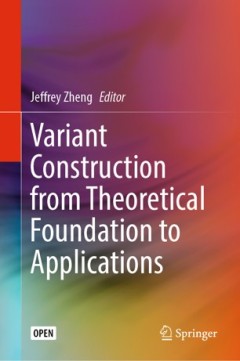
Variant construction from theoretical foundation to applications
This open access book presents theoretical framework and sample applications of variant construction. The first part includes the components variant logic, variant measurements, and variant maps, while the second part covers sample applications such as variation with functions, variant stream ciphers, quantum interference, classical/quantum random sequences, whole DNA sequences, and multiple-va…
- Edition
- -
- ISBN/ISSN
- 9789811322822
- Collation
- xxiv, 409p. : ill.
- Series Title
- -
- Call Number
- 519.538 VAR v
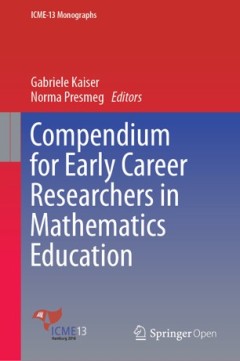
Compendium for early career researchers in mathematics education
The purpose of this Open Access compendium, written by experienced researchers in mathematics education, is to serve as a resource for early career researchers in furthering their knowledge of the state of the field and disseminating their research through publishing. To accomplish this, the book is split into four sections: Empirical Methods, Important Mathematics Education Themes, Academic Wr…
- Edition
- -
- ISBN/ISSN
- 9783030156367
- Collation
- xiv, 532p. : ill.
- Series Title
- -
- Call Number
- 510.71 COM c
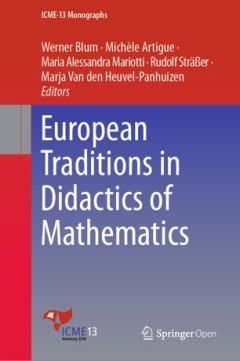
European traditions in didactics of mathematics
This open access book discusses several didactic traditions in mathematics education in countries across Europe, including France, the Netherlands, Italy, Germany, the Czech and Slovakian Republics, and the Scandinavian states. It shows that while they all share common features both in the practice of learning and teaching at school and in research and development, they each have special featur…
- Edition
- -
- ISBN/ISSN
- 9783030055141
- Collation
- v, 212p. : ill.
- Series Title
- -
- Call Number
- 510.71 EUR e
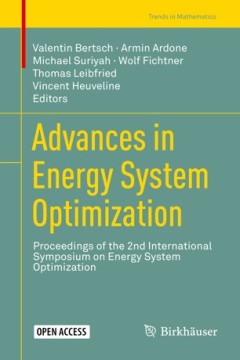
Advances in energy system optimization : proceedings of the first Internation…
The papers presented in this open access book address diverse challenges in decarbonizing energy systems, ranging from operational to investment planning problems, from market economics to technical and environmental considerations, from distribution grids to transmission grids, and from theoretical considerations to data provision concerns and applied case studies. While most papers have a cle…
- Edition
- -
- ISBN/ISSN
- 9783030321574
- Collation
- viii, 178p. : ill.
- Series Title
- -
- Call Number
- 621.319 ADV a
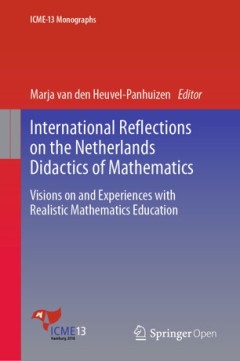
International reflections on the Netherlands didactics of mathematics : visio…
This open access book, inspired by the ICME 13 Thematic Afternoon on “European Didactic Traditions”, takes readers on a journey with mathematics education researchers, developers and educators in eighteen countries, who reflect on their experiences with Realistic Mathematics Education (RME), the domain-specific instruction theory for mathematics education developed in the Netherlands since …
- Edition
- -
- ISBN/ISSN
- 9783030202231
- Collation
- ix, 366p. : ill.
- Series Title
- -
- Call Number
- 510.71 INT i
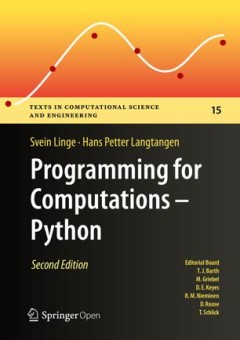
Programming for computations - Python : a gentle introduction to numerical si…
This book presents computer programming as a key method for solving mathematical problems. This second edition of the well-received book has been extensively revised: All code is now written in Python version 3.6 (no longer version 2.7). In addition, the two first chapters of the previous edition have been extended and split up into five new chapters, thus expanding the introduction to programm…
- Edition
- -
- ISBN/ISSN
- 9783030168773
- Collation
- xxiii, 323p. " ill.
- Series Title
- -
- Call Number
- 004.0151 LIN p
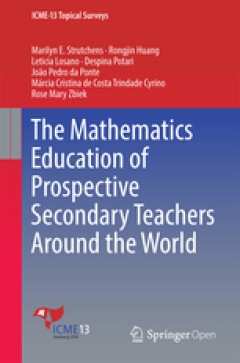
The mathematics education of prospective secondary teachers around the world
This volume shares and discusses significant new trends and developments in research and practices related to various aspects of preparing prospective secondary mathematics teachers from 2005–2015. It provides both an overview of the current state-of-the-art and outstanding recent research reports from an international perspective. The authors completed a thorough review of the literature by …
- Edition
- -
- ISBN/ISSN
- 9783319389653
- Collation
- 58 p.
- Series Title
- -
- Call Number
- 370 MAT m

The philosophy of mathematics education
This survey provides a brief and selective overview of research in the philosophy of mathematics education. It asks what makes up the philosophy of mathematics education, what it means, what questions it asks and answers, and what is its overall importance and use? It provides overviews of critical mathematics education, and the most relevant modern movements in the philosophy of mathematics. A…
- Edition
- -
- ISBN/ISSN
- 9783319405698
- Collation
- 26 p.
- Series Title
- -
- Call Number
- 510.71 PHI p
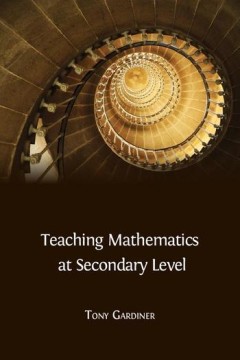
Teaching mathematics at secondary level
Teaching Mathematics is nothing less than a mathematical manifesto. Arising in response to a limited National Curriculum, and engaged with secondary schooling for those aged 11 ̶ 14 (Key Stage 3) in particular, this handbook for teachers will help them broaden and enrich their students’ mathematical education. It avoids specifying how to teach, and focuses instead on the central principles a…
- Edition
- -
- ISBN/ISSN
- 9781783741397
- Collation
- vii, 316p. : ill.
- Series Title
- -
- Call Number
- 510.712 GAR t

Mathematics of economics and business
For all students who wish to understand current economic and business literature, knowledge of mathematical methods has become a prerequisite. Clear and concise, with precise definitions and theorems, Werner and Sotskov cover all the major topics required to gain a firm grounding in this subject including sequences, series, applications in finance, functions, differentiations, differentials and…
- Edition
- -
- ISBN/ISSN
- 9780203401385
- Collation
- xvii, 516p. : ill.
- Series Title
- -
- Call Number
- 330.0151 WER m
 Computer Science, Information & General Works
Computer Science, Information & General Works  Philosophy & Psychology
Philosophy & Psychology  Religion
Religion  Social Sciences
Social Sciences  Language
Language  Pure Science
Pure Science  Applied Sciences
Applied Sciences  Art & Recreation
Art & Recreation  Literature
Literature  History & Geography
History & Geography